Peers who’ve been down a similar road can show young people that they don’t have to change who they are to reimagine their futures.
When June Sutton first got involved with the Brownsville Community Justice Center as a young man, he was given a unique task—“100 handshakes in ten days.” Along with his peers, he had ten days to walk up to a hundred people from the neighborhood, introduce himself, and shake their hand.
The idea of striking up a conversation with a hundred people who felt like total strangers was intimidating. “At first I really didn’t want to do it,” said June. “But then it was like, ‘This is kind of cool, I’m actually meeting new people.’ And soon enough we were getting more like 300 handshakes in ten days.”
Today, he’s still at the Community Justice Center—this time as a staff member, preventing gun violence by helping young people be fully themselves while building community with others.
For years, our teams in Brooklyn and the Bronx have worked to stop gun violence by engaging people most impacted, defusing conflicts, changing narratives, and supporting community-led projects to build safety and well-being. Like June, many of those staff members were once participants in our programs themselves, with similar experiences as the young people they work with today to help them reimagine their futures.
“It’s about genuine relationships…”
At the heart of that work is peer mentorship. With deep roots in the social networks of their communities, our staff are able to build lasting trust and serve as role models. Instead of asking young people to change who they are, peers encourage them to be who they are—fully and unapologetically.
What that means looks different each day. It can mean checking in with young people regularly and connecting them to tangible resources, from therapy and counseling to creative opportunities. It can mean being there for real conversations—about emotions, about gender, about what it means to be a young Black man in the United States today. And it also means “walking the walk,” using their own journeys to give young people real-life examples of what else is possible.
“If they can follow you wrong, they can follow you right, too,” says Derick Alvarez of our Bronx Community Justice Center.
What makes the experience transformative for young people is that it isn’t just a program—it’s about people. “It’s about genuine relationships and genuine love,” says Lenny Smalls, who works as a mentor at our Brownsville Community Justice Center. For young people who struggle to feel seen and heard in many environments, those relationships can be a safe haven for exploring new parts of themselves and new possibilities for the future.
The healing power of community
Safety is much more than the absence of danger. To truly feel safe, we need opportunities for community and connection. As our staff build personal relationships with young people as individuals, they also create spaces where they can be themselves in community with each other.
They do that, in part, by engaging with different groups of young people who are in conflict with each other to bridge divides and work towards understanding. Through long-term, transformative mediation, our peers sit down with small groups of young people to talk through the root causes of tension and how those rifts are playing out in the community. Then they bring the different groups together in environments that feel safe to build relationships, breaking down barriers that fuel cycles of harm.
“A lot of our young people live in a perception of danger and that becomes the reality they have,” says June. “So we work on teaching our young people how to give greetings and how to accept greetings. And it just breaks down that shell.”
Young people in the lead
In all of their work, our teams give young people the chance to take an active role in shaping the programs they’re participating in. They’re in the driver’s seat, taking the lead on community design projects that bring neglected public spaces to life and organizing events like the B-Live Music and Arts Festival—now a beloved neighborhood tradition.
Our staff also encourage their mentees to pursue their talents and goals. “Giving young people a sense of responsibility can change the way they look at themselves and give them confidence to step into new spaces in the future,” says Mubarak (“Bless”) Ahmad, an education and career specialist from our Neighbors in Action team. “A lot of the youth we work with get written off by their communities. So we try to create spaces where they’re allowed to make mistakes and learn from them.”
Using the connections our programs have with other local organizations and businesses, our staff open doors to internships, jobs, and entrepreneurship opportunities in a wide range of fields, especially ones where people of color are underrepresented—from fashion and music to the culinary arts. Young people are paired with mentors from the community who help them learn the skills they need to find fulfilling careers while also serving as guides and role models.
Besides putting young people on a path to meaningful jobs, these opportunities give them a deeper sense of agency in shaping their own lives and journeys. And in areas impacted by gentrification, where young people can feel alienated from certain spaces in the neighborhoods they grew up in, they also help them feel more belonging and ownership over their own communities.
Too often, people who are closest to the gun violence crisis are told that they have to change who they are to lead safer lives. It takes peers who’ve been down a similar road themselves to show young people they don’t have to change who they are in order to rewrite their futures.
